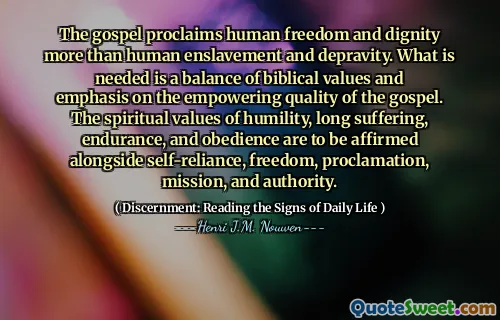
The gospel proclaims human freedom and dignity more than human enslavement and depravity. What is needed is a balance of biblical values and emphasis on the empowering quality of the gospel. The spiritual values of humility, long suffering, endurance, and obedience are to be affirmed alongside self-reliance, freedom, proclamation, mission, and authority.
This quote from Henri J.M. Nouwen's Discernment: Reading the Signs of Daily Life eloquently invites us to reflect on the comprehensive nature of the gospel message. It challenges the common misconception that the gospel only highlights human weakness and depravity by asserting that its true proclamation centers on human dignity and freedom. This thought provokes an expansive understanding of spirituality, one that embraces seemingly opposing values within a balanced framework.
Nouwen underscores the importance of holding together the traditional virtues of humility, long suffering, endurance, and obedience with qualities such as self-reliance, freedom, proclamation, mission, and authority. This harmony speaks to a gospel that does not subdue human agency but rather empowers it through divine truth and grace. It rejects any rigid dichotomies where spiritual values oppose human strength or where authority suppresses freedom.
In a world that often presents binary choices—humility versus pride, submission versus independence, weakness versus strength—Nouwen’s reflection encourages a synthesis where spiritual maturity encompasses both endurance in trials and confident proclamation of faith. It is a reminder that discipleship can entail obedience to God's will while embracing the call to mission and leadership.
Ultimately, this balance reflects a mature faith that neither denies the reality of human brokenness nor diminishes the calling to freedom and authority in Christ. The quote renews the invitation to live out a gospel that empowers and dignifies, fostering a holistic approach to human identity and ministry.






